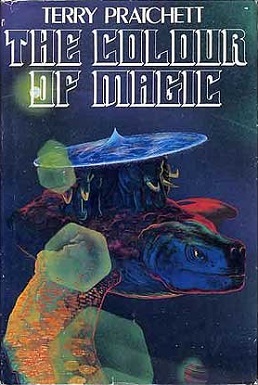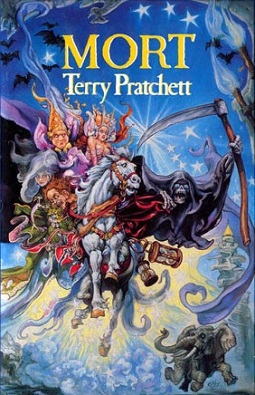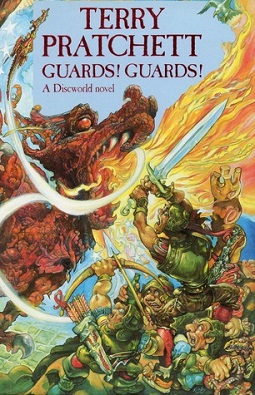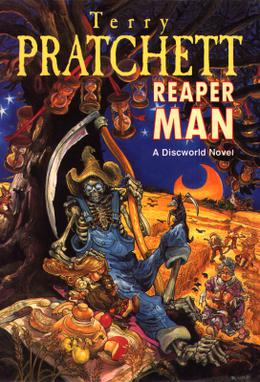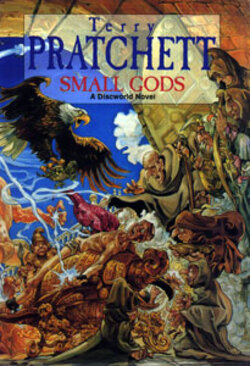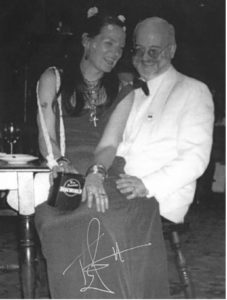One American writer said to me, “Your books will never sell in America because you can’t hear the elves sing. Americans go in for fantasy books where you can hear the elves sing.”
I would like that put on my gravestone: “At least you can say that in Pratchett’s books, the bloody elves never sang!”
— Terry Pratchett
Two arguments are commonly trotted out for the genre literature of the fantastic as actually or potentially something more than mere escapism. One, which applies only to the science-fiction side of the science-fiction/fantasy divide, claims that it can be a form of useful social prognostication. By observing the trends of the current day, the writer can extrapolate where we are likely to end up in the future and present it vividly on the page, whether as a prophecy or a warning. Granted, science fiction’s record of prediction is not particularly good; the writers of just a handful of decades ago almost all believed we would have settled Mars by now, while vanishingly few of them imagined anything like the modern Internet. Still, if you believe that a society’s hopes and fears for the future say a lot about its present, there is a certain sociological value even in the failed prognostications. (Indeed, the academic critic Farah Mendlesohn goes so far as the claim that much classic science fiction is “a sense of wonder combined with [a] presentism” which only masquerades as futurism.)
But it’s the other argument for fantastic literature’s enduring worth that I find most convincing: by transporting some of our most fraught current problems and conflicts into another, less familiar context, we can examine them in a fresh light. Many of us have thought at one time or another how weird our ceaselessly squabbling planet must look to any aliens who happen to stumble across it, what with all the trivialities we continue to fight and kill one another over and the looming existential threats we continue to leave woefully under-addressed. Not only science-fiction but also fantasy literature can literally or figuratively put us in the shoes of those aliens (assuming they wear shoes), allowing us to examine ideas and values with fresh eyes, less cultural baggage, and less of a knee-jerk response.
From the mid-1980s until the mid-2010s, the writer who made perhaps the most consistent case of all for fantasy literature as a laboratory of ideas that are eminently relevant to the real world was Terry Pratchett. And if that didn’t do it for you — well, he really was quite funny to boot.
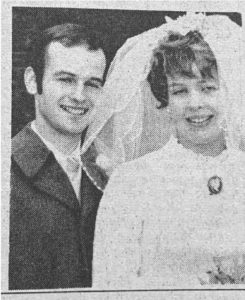
Terry and Lyn Pratchett on their wedding day in 1968. On their honeymoon, Terry would grow the beard which he would sport for the rest of his life.
Terence David John Pratchett was born on April 28, 1948, in a rural village in Buckinghamshire, England. The only child of an auto mechanic and a secretary, he grew up in a house with no indoor toilet, no hot water, and no electricity. But a less economically advantaged upbringing does not automatically mean a bad one: young Terry spent his days rambling over the same green and pleasant English landscapes that had inspired J.R.R. Tolkien’s Shire, while in the evenings he read books by the light of an oil lamp. Amidst it all, he absorbed his parent’s commonsense belief in what the British call “common decency.” He was not a member of the social class that typically went to university, and this was never regarded as a serious option for him by his teachers or his parents even when he showed an unusual talent for reading and writing. Instead he walked into the office of his local newspaper at the age of seventeen and asked to become an apprentice journalist.
And so he embarked on what his peers and his betters would have considered a perfectly respectable if not quite exciting life for one of his social station. He spent a decade and a half working as a small-town beat reporter, columnist, and editor, before switching to a less demanding job with the civil service, as a press officer for the Central Electricity Generating Board. Betwixt and between his professional accomplishments, he married his first-ever girlfriend before he turned 21, fathered a daughter with her, and lived with his family in a tidy little cottage no better nor worse than a thousand others in its corner of England.
He had just one obvious eccentricity: he loved science-fiction and especially fantasy literature, and wrote some of it himself on and off. By 1982, he had published three competent if derivative novels, in small print runs with the help of a friend with the requisite connections. Yet his closest brush with real literary fame remained the letter he had received from J.R.R. Tolkien back in 1968, in response to a piece of fan mail he had sent to the aging Oxford don.
By this point, fantasy literature had well and truly come into its own, thanks to the ongoing popularity of Tolkien and an odd new tabletop game called Dungeons & Dragons that was reaching Britain from American shores. Bookstore shelves were filling up with fat, multi-volume epics from other authors like Terry Brooks and Raymond E. Feist, who were all straining so hard to be Tolkien that one could almost hear them huffing and puffing in the background as one turned the pages. But Terry Pratchett, despite loving Tolkien so much himself that he claimed to have read The Lord of the Rings at least once per year ever since discovering it at the age of thirteen, wasn’t at all sure that such slavish imitation was the best form of flattery. He decided to write a book making fun of the trend.
To be sure, it wasn’t the highest-hanging of fruit as targets of satire went; these ponderous, interminable, oh-so-serious tomes could almost be read as parodies of Tolkien already, albeit inadvertent ones. Nor was Pratchett the first writer to have the idea; as early as 1969, when “Frodo Lives!” could be found emblazoned on the walls of the Boston subway alongside “Clapton is God!”, a pair of Harvard students had published a satire of the counterculture’s favorite fantasist called Bored of the Rings. But thankfully, Pratchett had a cleverer approach in mind than their frat-boy slapstick.
The germ of it dated back to 1978, and a column he had written poking gentle fun at the Star Wars craze. His long experience as a reporter had taught him that the proverbial little people of our own or, presumably, any other world are more exercised by mundane concerns than epic adventure. Applying this lesson to Star Wars, he offered up a science-fictional take on the banality of evil, in the form of the chief personnel officer on the Death Star, fielding complaints about the lousy coffee in the canteen, parrying worries over all those droids that were taking so many human Stormtroopers’ jobs.
Now, taking the same approach over to a world of epic fantasy, Pratchett considered what the little people there would be doing while the heroes were prattling on about Courage and Sacrifice and all the rest of that rot. The star of this “realist fantasy” — a term invented by Pratchett’s biographer Marc Burrows — would be an inept wizard named Rincewind, a perpetual graduate student at a school of magic called Unseen University. His greatest talent would be that of shirking danger and, when push came to shove, simply running away as fast as his knobby-kneed little legs could carry him. For, as Burrows writes, “when faced with violence and the threat of death, most people do not throw themselves honourably into the fray: they get the hell out of there. Rincewind is the very distillation of Pratchett’s central premise of treating a fantasy world literally.”
The fantasy world in question is, as Pratchett wrote at the beginning of the book and then proceeded to spend the next 30 years patiently repeating at the beginning of every interview he gave to the mainstream media, a flat disc borne on the backs of four giant elephants, who in turn stand on the back of a giant turtle swimming through the outer space of “a distant and secondhand set of dimensions, in an astral plane that was never meant to fly”; the premise displays Pratchett’s lifelong interest in astronomy and Hindu cosmology, as well as his love of dreadful puns. The chronically exasperated Rincewind and his unlikely companion, a naïve tourist named Twoflower whose insatiable curiosity causes him to run toward every danger from which Rincewind wants to run away, spend the book traveling across the Discworld and getting caught up in a series of comic misadventures that expose countless inviolate fantasy clichés to the cold, harsh light of real-world logic. At the time, Pratchett seems to have seen the book he called The Colour of Magic as little more than a palate cleanser between more substantial ones. The cliffhanger ending was just another concession to the genre he was lampooning; maybe he’d actually write a sequel someday, maybe he wouldn’t.
The Colour of Magic was published in November of 1983, in a British print run of just 506 copies, a testament to its publisher’s low expectations. Nothing happened right away to prove they were mistaken; the books languished on shelves for months. But then Pratchett had the stroke of luck which every budding superstar author needs. Some years ago now, the BBC had broadcast a radio serial by one Douglas Adams, a comedic send-up of science fiction that was similar in spirit to what Pratchett was now doing for (or to) the fantasy genre. Adams’s The Hitchhiker’s Guide to the Galaxy had gone on to become a very hot property indeed, spawning three internationally bestselling novels to date along with record albums, a BBC television series, and, soon, a hit computer game. In light of all this, the BBC decided to give The Colour of Magic a try over the airwaves. Between June 27 and July 10, 1984, BBC Radio 4 broadcast an abridged reading of the book by Nigel Hawthorne, one of the stars of the hugely popular television sitcom Yes, Minister. The programs received a very good response, putting Terry Pratchett’s name on the lips of everyday Britons for the first time ever. Just like that, things started to happen. In January of 1985, Corgi, a British division of Bantam Books, published The Colour of Magic in paperback, with an initial print run of no less than 26,000 copies. A second print run was needed well before the end of the year. Discworld was off and running.
With his fiction receiving widespread attention for the first time ever, Pratchett needed little encouragement to write that sequel to The Colour of Magic now rather than later. The Light Fantastic, which was published in June of 1986, was largely more of the same, notable mostly for having a slightly more focused plot and for giving prominent place to the character of Death — you know, the skeleton dressed all in black, with the scythe and so on. Belying his terrifying appearance, Death’s Discworld persona is that of an overworked, sometimes irascible, but basically well-meaning bureaucratic functionary. In time, he became arguably the most beloved of all Pratchett’s recurring characters. Many Discworld fans, facing the last days of a loved one or even their own final exit, have found surprising comfort in the seven-foot-tall, cat-loving apparition who brings peace with him rather than pain or judgment. He was an early sign that there might be something more to Discworld than just a succession of clever gags.
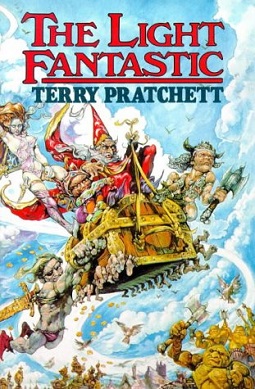
Pratchett was very fortunate to connect with an artist named Josh Kirby, whose colorful, winsome, but often subtly subversive covers became the indelible look of Discworld, impossible to separate in the minds of most fans from the words on the page.
Still, it wasn’t entirely unreasonable even at this stage to see Pratchett as an author trying his derivative darnedest to be fantasy fiction’s answer to Douglas Adams. It hadn’t helped his cause when, in a couple of unguarded early interviews, he had admitted that he had been reading the Hitchhiker’s books at the same time he was writing The Colour of Magic. Now, though, he was bristling at the comparison more and more. Adams’s works, he claimed with some truth, were archer, colder, and crueler than his own humor; Adams laughed at his characters, while Pratchett laughed with them at the absurdity of the universe.
Whether it was written in response to the accusations of unoriginality or was just a natural progression, the next book in the Discworld series made the argument that Pratchett was nothing more than a second-rate Douglas Adams untenable. That said, the leap Pratchett made with Equal Rites, the third Discworld novel, was in some ways a fairly obvious one. He was already mining humor from portraying a world of heroic fantasy in a “realistic” way, imagining the experience of the characters there who weren’t larger-than-life heroes on epic quests, and showing how even the fantastic becomes by definition mundane as soon as it becomes the stuff of everyday life. (If you doubt this truism, just look at the technological wonders all around us today which would have seemed almost like magic 30 years ago, but to which we hardly give a thought…) From here, it was a relatively short leap to begin using Discworld as a philosophical laboratory to address the questions and problems with which our own mundane societies are grappling. And yet, short leap though it may have been, it was an audacious one nonetheless. “I want to get away from the idea that I’m automatically sending fantasy up,” Pratchett would say a few years later. “What I’m concerned about now is sending up ideas, ways of looking at the world, people’s expectations.”
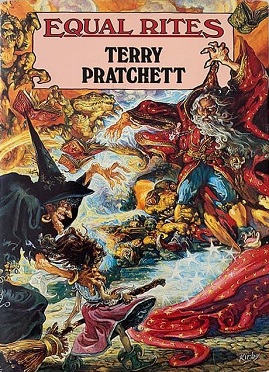
The phallic wand the female protagonist of Equal Rites is carrying as she claims powers usually reserved for men is a fine example of Josh Kirby’s subversive edge. Pratchett absolutely loved the image. As his characters loved to sing, “A wizard’s staff has a knob on the end…”
Published barely six months after The Light Fantastic, Equal Rites was the first Discworld novel that could be reasonably said to have overarching themes and a moral compass. Abandoning Rincewind and Twoflower for the time being, it’s a bildungsroman about the coming of age of a young girl — dangerous territory for a middle-aged male author to venture into, but Pratchett pulls it off pretty well. Of course, this being still a fantasy novel, her coming of age involves her coming into her own as a magic user, which in turn involves being apprenticed to the local witch and having many ensuing adventures. Nevertheless, the message the book hammers home relentlessly is as relevant to our own world as any message can possibly be. It’s right there in the book’s title (overlooking another dreadful pun): that women are every bit as capable as men, and deserve to be treated that way. There’s also an even broader and equally important theme, about the value of empathy in general. To illustrate this, Pratchett invents the magical skill of “borrowing,” which lets a being quite literally walk a mile in another being’s shoes — or, rather, in another being’s mind — experiencing the world as they do. If only all of us could and would do the same before we pass judgment…
The next Discworld book, Mort, was published in November of 1987, and remains among the most beloved of the canon, often recommended as an ideal place for beginners to start thanks to its very straightforward, self-contained plot. It involves Mortimer, a hapless young fellow who has just been hired for the dubious position of apprentice to Death. Among other things, the book is a sort of companion piece to Equal Rites, this story being about the travails of male adolescence. Even more so than its predecessor, Mort is elevated by its author’s essential humanity; there is no cruelty in Terry Pratchett. Pratchett:
In Mort, I keep referring to the “sex scenes,” and somebody who was interviewing me said, “But there aren’t any sex scenes in Mort!” I said, “No, but that’s what’s funny!” You see two young people who are terribly embarrassed in each other’s presence, which was about 90 percent of sex when I was a kid. That’s what it was all about: being horribly tongue-tied and embarrassed the whole time.
Much to Pratchett’s gratification, these most recent two, more ambitious Discworld novels sold even better than the first two, allowing him to quit his job in the civil service with the confidence of an established, bankable author. It was at this point that he separated himself from Douglas Adams in another way. If the latter had lived on the Discworld, he would doubtless have been written up as one of the practical jokes the gods there love to play on mortals: he was a brilliant writer who would rather do almost anything else than write, who, as he once memorably put it, preferred to spend his days soaking in a cozy bath and listening to deadlines whooshing by outside the window. Pratchett, on the other hand, had the work ethic of an ant colony. In the first five years after quitting his day job, he published ten Discworld novels, three non-Discworld novels for children, and the standalone novel Good Omens, a much-heralded collaboration with Neil Gaiman, author of the Sandman comic books. And then, as if all that wasn’t enough, Pratchett also found time to write a few short stories and a non-fiction book about cats.
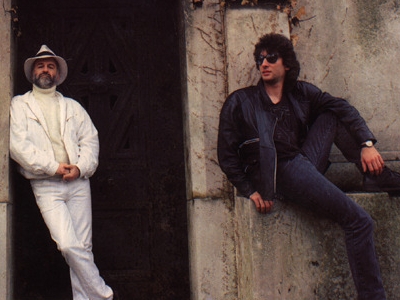
The middle-aged family man Terry Pratchett and the too-cool-for-school hipster Neil Gaiman, hobnobber with rock stars, made an odd couple to be sure, but the two genuinely liked and respected one another, and many fans consider Good Omens to be among the best things either ever wrote.
Needless to say, we can’t hope to analyze this fire hose of output in any depth here. Suffice to say that Pratchett kept pushing at the boundaries of what a Discworld novel could be, producing everything from intricately plotted detective yarns to poignant character studies, along with the occasional unabashed satirical romp for diehard fans of Rincewind and Twoflower and their ilk. We shouldn’t get too precious about Pratchett’s books from this or any other period; as he would be the first to admit, he was first and foremost a commercial author writing with at least one eye on the needs of the market. He wasn’t above gloating a bit over each huge check that rolled in from his publisher, and very much wanted to keep the money spigot open. Doubtless many of his books could have been even better if he had spent more time with them, if he hadn’t felt compelled to rush pell-mell to the next one. On the other hand, much the same thing can be said of many another highly regarded author, and not just in the genre literatures; the names of William Shakespeare and Charles Dickens come to mind as just two of history’s insanely prolific writers-for-hire with a surfeit of genius.
We might pull out just a few books from this era by way of illustrating just how far Discworld could stray from the template of The Colour of Magic. Take, for example, the 1989 novel Guards! Guards!, another one often recommended by the Discworld cognoscenti as an excellent starting point.
In it, a cabal summons a dragon to lay piecemeal waste to the sprawling metropolis of Ankh-Morpork, the biggest city on the Disc. One of the usually shiftless Ankh-Morpork police force, a fellow named Sam Vimes who would go on to become the most frequently recurring Discworld-novel protagonist of all, has the bright idea of actually investigating for a change, leading to both comedy and drama. Guards! Guards! can be considered a landmark in the evolution of the Discworld series thanks to the presence of Vimes alone. He is, claims Pratchett’s biographer Burrows, “a character that grew out of Pratchett’s need to put his personality on the page. Vimes is a deposit for the author’s burning anger, and is fueled by a deep sense of injustice that Pratchet had so far managed to keep a lid on. The character is utterly flawed. He’s a drunk, he spends his life miserable, and, despite a keen intelligence, has a habit of speaking truth to power that has kept him from rising further than the city’s least-desirable command — captain of the night watch.”
Writing in a genre famous for seeing good and evil as (sometimes all too literally) white and black, Pratchett understands how the gray of ordinary people leading ordinary lives can slowly but surely turn into deepest ebony.
There are people who will follow any dragon, worship any god, ignore any inequity. All out of a kind of humdrum, everyday badness. Not the really high, creative loathsomeness of the great sinners, but a sort of mass-produced darkness of the soul. Sin, you might say, without a touch of originality. They accept evil not because they say yes, but because they don’t say no.
Or take 1991’s Reaper Man, the second Discworld novel with Death as a main protagonist. The books begins with a crazy premise: that Death has retired to become a farmhand, which causes serious problems on the Disc as everyone currently alive becomes suddenly immortal. What initially seems like nothing but another clever gag becomes in due course a wise, compassionate meditation on time and its passing, on how birth and death are the natural, necessary way of the universe, on how old lives must ultimately end to make space for young ones.
No one is finally dead until the ripples they cause in the world die away — until the clock he made winds down, until the wine she made has finished its ferment, until the crop they planted is harvested. The span of someone’s life is only the core of their actual existence.
Or take 1992’s Small Gods, a simultaneously satirical and sympathetic examination of the eternal human quest for Higher Truths, told from the standpoint of both idealists and cynics.
Take it from me, whenever you see a bunch of buggers puttering around talking about truth and beauty and the best way of attacking Ethics, you can bet your sandals it’s because dozens of other poor buggers are doing all the real work around the place…
Here’s a riff on Plato that comes about as close as any passage can to summing up Pratchett’s philosophy of a happy life:
Life in this world is, as it were, a sojourn in a cave. What can we know of reality? For all we see of the true nature of existence is, shall we say, no more than bewildering and amusing shadows cast upon the inner wall of the cave by the unseen blinding light of absolute truth, from which we may or may not deduce some glimmer of veracity, and we as troglodyte seekers of wisdom can only lift our voices to the unseen and say, humbly, “Go on, do Deformed Rabbit… it’s my favorite.”
And then there’s my very favorite, as cogent an argument for the value of blue-sky research as I’ve ever read:
It’s always worth having a few philosophers around the place. One minute it’s all Is Truth Beauty and Is Beauty Truth, and Does A Falling Tree in the Forest Make A Sound if There’s No One There to Hear It, and then, just when you think they’re going to start dribbling, one of ’em says, “Incidentally, putting a thirty-foot parabolic reflector on a high place to shoot the rays of the sun at an enemy’s ships would be a very interesting demonstration of optical principles.”
By the early 1990s, Pratchett had managed an incredible, not to say paradoxical, feat: he had busted right out of the fantasy ghetto whilst remaining an unapologetic genre author in outlook and orientation. You were guaranteed to see at least one or two Discworld novels during any given trip on the London Underground, as often as not clutched in the hands of riders who were not your stereotypical fantasy nerds. Discworld cut across all the usual boundaries of class, age, race, and gender. In 1992, W.H. Smith, the biggest bookstore chain in Britain, stated that 10 percent of their total science-fiction and fantasy sales consisted of Terry Pratchett books. By 1998, Pratchett accounted for 2 percent of all their revenues. When you combined the sales of all of his novels together, he became simply the most popular single British author of the 1990s. There was something comforting in the way that these unpretentiously entertaining, gently wise books were able to hold their own and then some against all of the latest controversial political screeds and tawdry celebrity memoirs. If Discworld wasn’t quite great literature, it was certainly a cut above most of the rest of the bestseller list.
Pratchett himself was only slightly slowed by the interviews and book signings that came with being Britain’s most popular living author; he continued to crank out a reliable two books per year. Unlike so many authors whose names have become a brand, Pratchett never stooped to hiring ghostwriters to create his content; every word in every Discworld novel was his own. He became a very rich man, but that didn’t slow him down either. Clearly money wasn’t the main reason he wrote. While he enjoyed it in a way, that way was mostly as a handy measure of his success; his actual lifestyle changed surprisingly little.
For all of Discworld‘s 1990s popularity in Britain and some other parts of Europe — Germany proved another especially strong market — it never became more than a cult phenomenon in the United States. (Tellingly, the British edition of Good Omens listed Pratchett’s name first as the more salable author, while the American edition did just the opposite.) This relative failure irked Pratchett, who went so far as to rewrite parts some of his books to better suit what he judged to be the American comedic sensibility. Nonetheless, he wouldn’t manage to place a book on the New York Times bestseller list until 2004.
There really are no obvious American analogues for Pratchett’s place in British pop culture during the decade before that one. Piers Anthony churned out whimsical fantasy novels set in his own pun-strewn world of Xanth at almost as prodigious a pace, and fostered a similarly personal connection with his readers, but his series was vastly more crass, formulaic, and juvenile, not at all the sort of thing most respectable adults were willing to be caught reading on a train.
Confined to Europe though it was, the 1990s Discworld mania was very real and very huge. In addition to the novels themselves, there were television cartoons, audio books, music CDs, collectible figures and toys, tee-shirts and other clothing, jewelry, candles, maps, companion source books, quiz books, a tabletop role-playing game, paper fanzines, conventions, websites, and one of the most popular newsgroups on Usenet: alt.fan.Pratchett, where the author himself occasionally dropped by to leave a post. “Anyone could be a Discworld fan,” writes Marc Burrows, “and sometimes it felt like just about everybody was.”
Naturally, then, there were also computer games…
(Sources: the books The Magic of Terry Pratchett by Marc Burrows and The Cambridge Companion to Science Fiction edited by Edward James and Farah Mendlesohn; Starlog of August 1990 and May 2000. And of course the many books of Terry Pratchett!)
